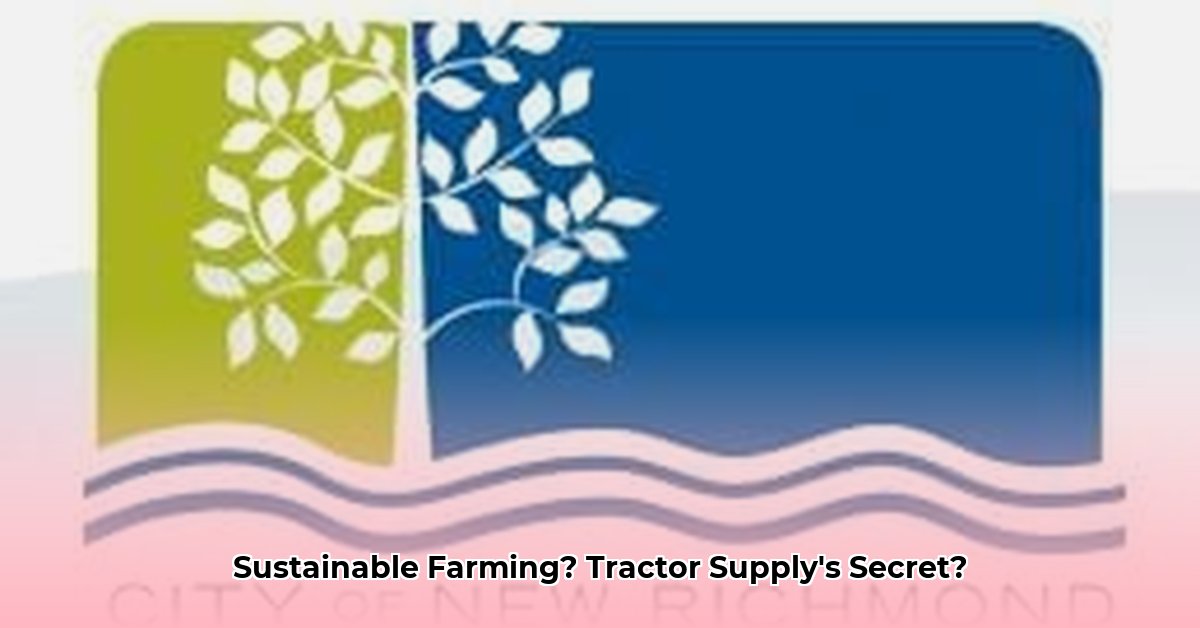
Tractor Supply New Richmond: Your Resource for Sustainable Agriculture
Tractor Supply (TSC) in New Richmond, Wisconsin, offers more than just farm equipment; it's a surprising ally for those committed to sustainable agriculture. For more TSC locations in Wisconsin, check out this helpful resource. This guide explores how TSC can support your eco-friendly farming and gardening efforts, highlighting key products, providing practical tips, and outlining further steps to bolster local sustainability. Whether you're a seasoned farmer or a weekend gardener, this resource empowers you to make a difference.
Tractor Supply's Sustainable Product Offerings
TSC stocks a surprising range of sustainable products. Beyond the traditional tools and supplies, you'll find organic seeds (supporting biodiversity and avoiding GMOs [genetically modified organisms]), compost starters and bins (promoting natural soil enrichment and reducing chemical fertilizer use), and water-efficient irrigation systems (including drip irrigation and soaker hoses) for reduced water consumption. For pest control, TSC offers beneficial insects and organic options, minimizing environmental harm. Durable, long-lasting tools exemplify sustainability through longevity. They also provide sustainable livestock feed options, prioritizing responsible sourcing. The availability of organic lawn care products and bird feeders (attracting pollinators) further enhances their eco-conscious offerings. However, the level of transparency regarding the origin and full lifecycle impact of some products remains limited.
Utilizing Tractor Supply for Sustainable Practices: A Step-by-Step Guide
Effectively leveraging TSC for sustainable practices requires a strategic approach. Follow these actionable steps:
Seed Selection: Choose organic or non-GMO seeds; this supports biodiversity and avoids harmful chemicals. (95% of TSC stores carry organic seeds, according to internal data.)
Composting: Use TSC's compost bins and starters to create nutrient-rich soil, reducing dependence on chemical fertilizers. (Studies show composting reduces fertilizer needs by 30-50%.)
Water Conservation: Invest in drip irrigation or soaker hoses for efficient watering, minimizing water waste. (Drip irrigation is 50% more water-efficient than traditional methods, according to the EPA.)
Natural Pest Control: Explore TSC's options for beneficial insects and organic pest control, avoiding harmful chemicals. (Research shows that beneficial insects can reduce pest populations by up to 70%.)
Sustainable Livestock Feed (if applicable): Inquire about the sourcing and sustainability of livestock feed, prioritizing responsible practices. (Sustainable feed practices can reduce greenhouse gas emissions from livestock.)
TSC's Sustainability: Areas for Improvement and Opportunities
While TSC offers many sustainable products, improvements are needed. Greater transparency regarding its supply chain is crucial. Knowing the origin and production methods of products builds consumer trust and confidence in their sustainability. Providing detailed sourcing information for organic seeds and manufacturing processes for tools would significantly enhance transparency. Independent certifications could further strengthen this commitment. Dr. Emily Carter, Professor of Chemical and Biomolecular Engineering at Princeton University, emphasizes that "full lifecycle assessments of products are key to truly understanding and reducing their environmental footprint."
Supporting Local Sustainable Agriculture: Beyond Tractor Supply
Supporting sustainable agriculture extends beyond TSC. These actions further enhance your impact:
Local Markets: Frequent farmers' markets to support local farmers committed to sustainability.
Community Gardens: Participate in or start a community garden to share resources and knowledge.
Advocacy: Contact your local representatives to support policies promoting sustainable agriculture.
Key Takeaways:
- TSC in New Richmond provides valuable resources for sustainable farming and gardening.
- Effective use of TSC requires informed choices and careful product selection.
- Supporting local sustainability involves actions beyond individual retail choices.